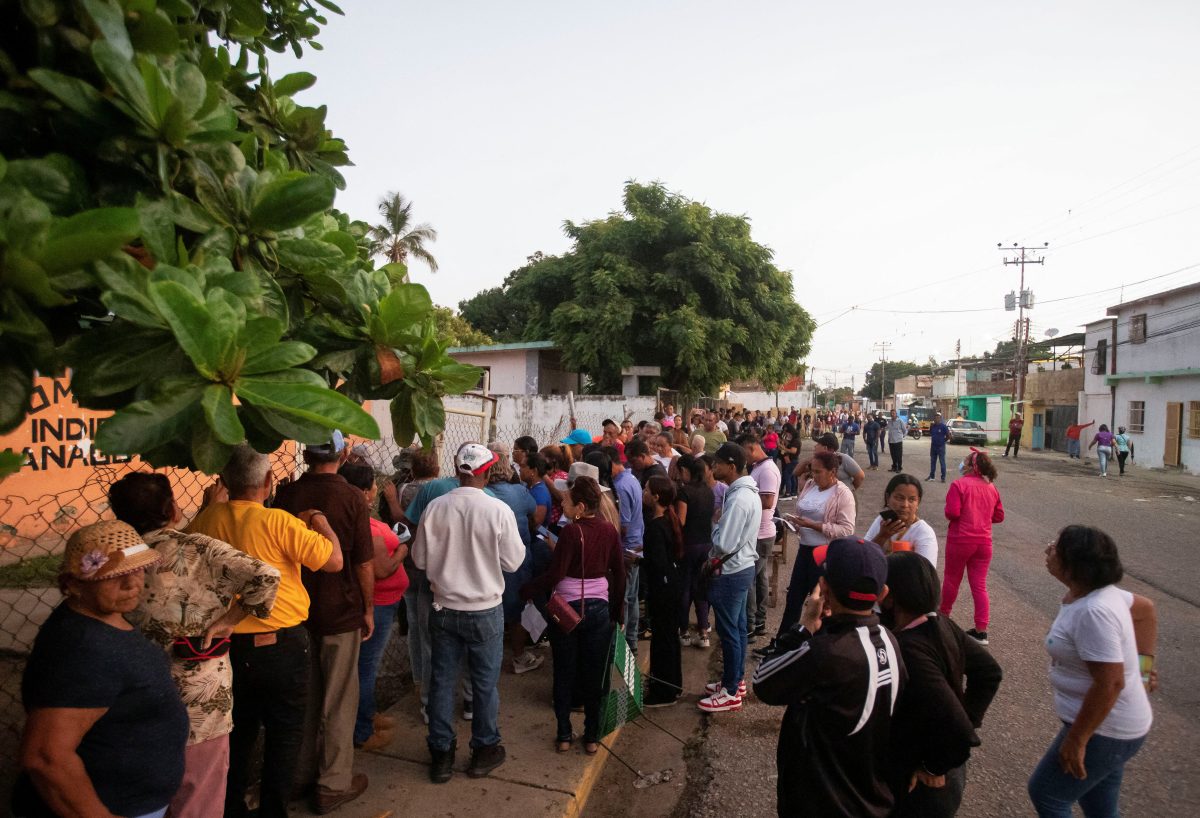CARACAS, (Reuters) – Venezuelans waited in line at polling stations and cast ballots on Sunday in the most consequential election in a quarter-century of socialist party rule, with President Nicolas Maduro confident of victory even as the opposition has attracted impassioned support and warned of possible irregularities.
Opposition leader Maria Corina Machado has been the star of the coalition campaign, even after a ban on holding public office forced her to pass the torch to candidate Edmundo Gonzalez, a 74-year-old ex-diplomat known for his calm demeanor.
Gonzalez has won backing even from some former supporters of the ruling party, but the opposition and observers have questioned whether the vote will be fair, saying decisions by electoral authorities and the arrests of opposition staff are meant to create obstacles.
Maduro – whose 2018 reelection is considered fraudulent by the United States, among others – has said the country has the world’s most transparent electoral system and has warned of a “bloodbath” if he were to lose.
Reuters journalists located in six cities around the country reported lines outside polling stations, including some that opened late.
“I’ve been here since 5 a.m. I came to vote for change, for a new Venezuela, which will be reborn and because I’m a public worker and we need change to be able to have a dignified salary,” said Tibisay Aguirre, a 57-year-old cook who was waiting in line in Maracay, in the central state of Aragua.
Polls close at 6 p.m. local time (2200 GMT) and results could be published on Sunday night or in the following days.
Maduro’s government has presided over an economic collapse, the migration of about a third of the population, and a sharp deterioration in diplomatic relations, crowned by sanctions imposed by the United States, European Union and others which have crippled an already struggling oil industry.
Maduro has said he will guarantee peace and economic growth, making Venezuela less dependent on oil income.
The minimum wage is equivalent to $3.50 per month, while basic food for a family of five is estimated to cost about $500. Many people receive government food baskets or remittances form relatives abroad.
Dozens of voters were casting ballots at the Venezuelan consulate in the Spanish island of Tenerife, with others gathered outside waving flags and cheering.
Several voters said they had been registered at that consulate for many years. Migrants around the world have reported difficulties registering and only a small percentage of the diaspora is expected to be able to vote.
THE CHAVEZ LEGACY
Maduro voted early in the morning in Caracas and said the result announced by the National Electoral Council will be recognized and “defended” by the armed forces and the police.
People attending Maduro’s closing rally in Caracas on Thursday spoke enthusiastically of his late mentor – long-time socialist President Hugo Chavez – and said Maduro, in power since Chavez’ death in 2013, was continuing his predecessor’s legacy of helping the poor.
“Nicolas Maduro is building up the country and continuing the legacy of Commander Chavez,” said Conde Miranda, 54, who traveled from southern Ciudad Guayana to attend.
Others alluded to a more challenging environment.
“Maduro has done both good things and bad things, the problem is the people below him,” said 30-year-old public employee Alejandro Goldteims.
Gonzalez and Machado, who have promised major changes and said a fresh start may motivate migrants to return, have urged people to hold “vigils” at polling stations. They have said they expect the military to uphold the results of the vote.
Venezuela’s military has always supported Maduro, a 61-year-old former bus driver and foreign minister, and there have been no public signs that leaders of the armed forces are breaking from the government.
Twenty-two people have been arrested since Friday “in the context of the electoral process,” Gonzalo Himiob, the vice-president of human rights organization Foro Penal, said on X, adding that at least 15 remain detained.
Venezuela’s attorney general this week denied participating in political persecution and said the election should be peaceful.
Public spending has grown only slightly during the campaign, analysts say, a change from past campaigns when spending was generous.
Maduro says he has opened 70 public works projects during the last several months but many have been renovations of already existing schools, hospitals and roads, according to events broadcast on state television.





